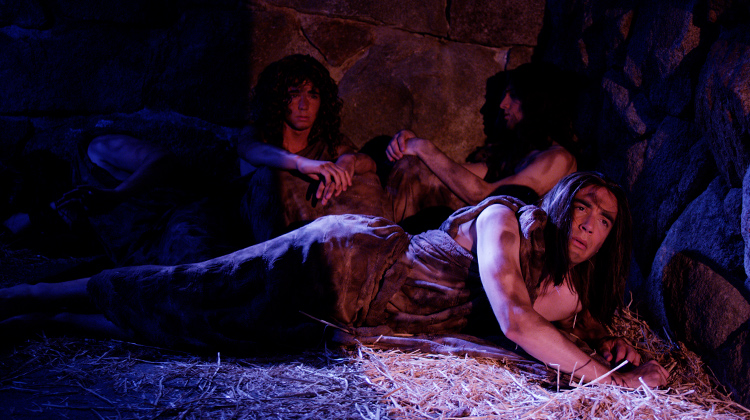When we think about the future of our children, our thoughts tend toward things like their education, their future spouse, and their walk with the Lord. Long hours are invested as we encourage them to obey God, hoping they learn from our mistakes rather than making their own. We imagine them enjoying the same comforts we have and maybe a few more.
Certainly, Daniel’s parents had similar ambitions. They gave their son a name that means “God is My Judge” and taught him to obey God’s law. According to the historian Josephus, Daniel came from a royal line, so we can suppose he also had an excellent education and social standing. In today’s terms, we might imagine him being active in church, lettering in sports, playing a musical instrument, and attending prestigious schools. We can picture Daniel’s parents working hard to give their son the brightest future possible.
In the early years of his life, no one would have envisioned Daniel spending his life in the service of a wicked king in a foreign palace, never to return. Even though the circumstances of Daniel’s life fell short of every reasonable expectation, the strength of his character allowed him to serve God courageously and rise to such a position of power that he was one of the most influential people of his time.
The Fulfillment of Isaiah’s Prophecy
Daniel was born during the reign of King Josiah—a time when the nation of Judah was experiencing spiritual revival (641-609 B.C.). But shortly after Josiah’s death, the nation slid into rebellion. God’s judgment and discipline were inevitable. More than one hundred years earlier the prophet Isaiah had given this warning:
(Isaiah 39:6-7)
Nebuchadnezzar II, the king of Babylon, fulfilled Isaiah’s prophecy when he deported Jerusalem’s best and brightest youths as slaves. And Daniel was one of them.
The Bible doesn’t tell us much about Daniel’s family. We don’t know if they were aware of Isaiah’s prophecy or if they recognized its fulfillment. It’s hard to imagine the emotions that must have swept over them when he was taken away. Would his spiritual training be enough? How would he survive in such a wicked place? Would God deliver Daniel from Nebuchadnezzar?
Qualifications for Serving in the King’s Palace
When Daniel arrived in Babylon, he could not have imagined what lay ahead. Most of the Jewish captives, like the prophet Ezekiel, ended up in refugee settlements and worked as slave laborers. Only a select few received white-collar jobs in the king’s palace. Daniel 1:3-4 describes the qualities that drew King Nebuchadnezzar’s attention to Daniel and his friends:
Daniel was probably only a teenager when Jerusalem fell to Babylon, but he possessed enough God-given physical, intellectual, and social aptitude to stand out from the crowd. Nebuchadnezzar brought young men like Daniel into the palace to demonstrate his absolute control over Judah, and to supply himself with a diverse pool of knowledgeable counselors. In one swift motion, he added trophies to his war chest and fresh minds to his brain trust. Judah was ravaged, but God was not finished with Daniel.

Conforming Without Compromising
When Daniel arrived in Babylon, he couldn’t change the fact that he was an intelligent, good-looking young man. He was bound to attract the king’s attention whether he wanted to or not. But there was one thing he had complete control over, and that was his character. Daniel could respond to his heathen conqueror with resentment and hostility or respect and humility. Scripture indicates that he chose to serve the king to the best of his ability. For more than seventy years, Daniel demonstrated poise, deference, and even compassion for his Babylonian captors.
How did he do it? How did Daniel serve an evil king without compromising his character?
Nebuchadnezzar’s plan for Daniel’s life couldn’t have been more different from the plans Daniel and his family envisioned, but Daniel obeyed every decree that did not compromise his faith. When he found it necessary to oppose the king’s orders, he did so with great diplomacy, and he trusted God with the outcome.
Daniel’s Babylonian Makeover
Immediately upon arrival in the king’s palace, Daniel faced a comprehensive Babylonian indoctrination program. Nebuchadnezzar’s plan wasn’t to simply educate Daniel and his friends; he wanted to separate them from their Jewish cultural training and transform them into Babylonians through-and-through. To accomplish this, the king implemented a four-part makeover.
- He educated them in “the language and literature of the Chaldeans” by immersing them in Babylon’s literature and learning, astronomy and astrology, architecture and religion (Daniel 1:4). All of this was designed to make them think like Babylonians. Jewish law did not prohibit learning the language and culture of a foreign nation, so Daniel and his friends complied. In fact, they exceled in their training program. Daniel 1:17 explains their success this way: “As for these four young men, God gave them knowledge and skill in all literature and wisdom; and Daniel had understanding in all visions and dreams.” The young Hebrews were far from their homeland, but they remained close to God’s heart.
- Nebuchadnezzar emasculated them. Though the book of Daniel does not state explicitly that Daniel and his friends were made into eunuchs, it is very likely they were. Ashpenaz, the man in charge of Daniel and the others, is referred to as “the master of [the king’s] eunuchs.” Making eunuchs of those who served in royal courts was a common practice in ancient kingdoms, and Isaiah’s prophecy had predicted it (2 Kings 20:18; Isaiah 39:7). A king like Nebuchadnezzar did not want his servants to have any desire except for him.
- He obligated them. Once Daniel and his peers were selected for roles in the king’s court, they were provided food from the king’s table. Nebuchadnezzar wanted them to grow accustomed to the luxuries of the palace so they would never again be satisfied with their old way of life. This may not sound so bad, but the food would have been left over from sacrifices to the Babylonian gods. To eat this kind of food was considered the same as worshiping a false god under Jewish law (Leviticus 11:47; Ezekiel 4:13).
That is why “Daniel purposed in his heart that he would not defile himself with the portion of the king’s delicacies, nor with the wine which he drank” (Daniel 1:8). So he petitioned Ashpenaz for permission to eat a diet of vegetables and water, and God blessed Daniel’s courage. He and his friends flourished on the vegetable-based diet. - Nebuchadnezzar assimilated them into the Babylonian culture by giving them new names. When they arrived in Babylon, each of these young men had god-honoring Hebrew names, given by godly parents. But Nebuchadnezzar gave them new names that honored Babylonian gods (Daniel 1:6-7).
- He changed Daniel’s name, which means “God is my judge,” to Belteshazzar, which means “Bel protect his life.”
- He changed Hananiah, “Yahweh is gracious,” to Shadrach, “the command of Aku”—the Babylonian moon god.
- He changed Mishael, “Who is what God is?” to Meshach, “Who is what Aku is?”
- He changed Azariah, “Yahweh is my helper,” to Abed-Nego, “Servant of Nebo,” after the second greatest Babylonian god, Nebo.
Nebuchadnezzar educated, emasculated, obligated, and assimilated the young Hebrews, but he could not change their nature. Though much of their daily life conformed to Babylonian culture, Daniel and his friends remained committed to Almighty God.
The Power of Daniel’s Character Enabled Him to Influence His Culture
As one of the king’s advisors or “wise men,” Daniel wielded tremendous power and influence. It would have been easy for him to become prideful, but the Bible never mentions a time when he accepted any kind of credit for himself. When his Babylonian peers failed to interpret a dream for the king, Daniel saved their heads by interpreting the dream, and he prefaced his interpretation with a blessing for the God of heaven. Here is what he said:
I thank You and praise You, O God of my fathers; You have given me wisdom and might, and have now made known to me what we asked of You, for You have made known to us the king’s demand.
(Daniel 2:20-23)
The Babylonian wise men had searched for answers in the stars, but Daniel knew the God who made the stars and the heavens. He asked the “God of heaven” to reveal the secret of Nebuchadnezzar’s dream. One author has written that “this designation for God… was particularly significant when used in a country foreign to Israel, for it carried the thought that God was over the sun, moon, and stars, which were worshiped by the pagans.”1

We might expect such a demonstration to secure Daniel’s place as an esteemed advisor in Nebuchadnezzar’s courts, but the next chapter finds him and his friends in danger of the death penalty when they refused to worship a golden statue. Knowing the consequences, Daniel and his friends placed their lives in God’s hands as they responded to the king’s command with these words:
(Daniel 3:16-18)
Not knowing whether God would deliver them from the furnace, Daniel and his friends stood firm. They did not plead for their lives or hurl insults or lose their faith. They knew they could not worship any god but One, and they were prepared to accept the king’s consequences.
Despite these experiences, Daniel continued to serve Nebuchadnezzar faithfully. When he interpreted another dream for Nebuchadnezzar in chapter 4, the message was troubling—the king would be cut down like a tree and humbled. In Daniel’s situation, another man might have relished the idea, but this devoted man of God expressed his wish that it might apply to Nebuchadnezzar’s enemies instead of to the king himself (Dan. 4:19).
How Can We Live Like Daniel Today?
Thinking back to Daniel’s childhood in Jerusalem, his parents’ dreams lay in ruins. God never delivered him from Babylon. He spent his entire adult life as a stranger in a foreign land, without a wife or children. He never returned home to worship God with his own people, let alone in the temple. Yet he walked with God every day of his life, and he exercised such discipline and strength of character that he became one of the most influential people in the most powerful kingdom of the world.
Daniel provides a roadmap for navigating our increasingly godless society. Our world needs more Daniels—more men and women who will determine to remain pure under any circumstances. We need people who will follow God wherever He leads and whatever the cost. Are you prepared to be a Daniel?

What similarities or differences do you find between the culture of today and that of Babylon?
Look up Romans 12:3 and Philippians 2:3-4. How do these verses relate to Daniel?
How would you respond to a king like Nebuchadnezzar?
How does Daniel’s commitment to his beliefs, even as a teenager, inspire you to be prepared for challenges to your faith?
~ ~ ~
Uncover Secrets From the Prophecies of Daniel
Dr. David Jeremiah has studied Daniel’s courageous life and ministry in Babylon extensively. We encourage you to continue your own study with resources from his Agents of Babylon and Handwriting on the Wall series.
Sources:
1Leon Wood, A Commentary on Daniel (Grand Rapids, MI: Zondervan Publishing, 1973), 59.

